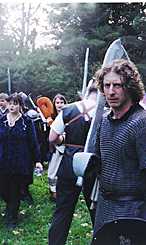 |
||||||||||||||||||||||||||||||||||||||||||||||||||||||||
|
We like to think that Mordavia has a well-considered design philosophy. Actually, we
make up rules and rationalise them later. But "philosophy" sounds better than "rationalisations."
 Play Objectives
The game is all about the playing. It's fun to workshop and socialise, but the success of
Mordavia lies in the events. Specifically, it lies in achieving immersion for the players and crew. That's
when you really feel like you are your character, and that the environment is real. Note the word "feel". You
don't actually believe that you're a hero in a medieval world. That's called psychosis. Don't get the two confused.
So how can we achieve immersion? Look right
When everyone around you is wearing suitable costume you're more inclined to have a gut reaction that the setting
is "real". That's why movie actors have costume and
makeup. That's why we ask for everyone to be appropriately costumed. Not because we're aiming
for historical authenticity, but because we want it to feel right.Get the environment right
 This is something that players have less control
over, but as organisers we try to get the venue looking as good as possible. Getting a scout camp to feel like
a medieval village is our most difficult obstacle. We insist on only candlelight being used in the Inn.
The flickering shadows greatly enhance the atmosphere. We dress up the interior of the Inn with hangings,
tableclothes, and candleabra. We use special effects to enhance scenes. We'd like to do more: let us know
if you have affordable suggestions.
This is something that players have less control
over, but as organisers we try to get the venue looking as good as possible. Getting a scout camp to feel like
a medieval village is our most difficult obstacle. We insist on only candlelight being used in the Inn.
The flickering shadows greatly enhance the atmosphere. We dress up the interior of the Inn with hangings,
tableclothes, and candleabra. We use special effects to enhance scenes. We'd like to do more: let us know
if you have affordable suggestions.Act right
 Immersive roleplaying is not about being a good actor, or being
dramatic or impressive. It's about acting as if you were your character. It's easier to achieve
immersion when other people are trying to achieve it too. When other players want to "get powerful", or "solve quests",
or "impress people" they usually screw up immersion for everyone around them. Try to be your character, and you'll
make it easier for everyone else to do the same. When someone else falls out of character, do them a favour and
ignore them. They probably want to roleplay, but they won't if you reward them for dropping out of character. Your
first objective is to help other people immerse in their characters by doing it yourself.
Immersive roleplaying is not about being a good actor, or being
dramatic or impressive. It's about acting as if you were your character. It's easier to achieve
immersion when other people are trying to achieve it too. When other players want to "get powerful", or "solve quests",
or "impress people" they usually screw up immersion for everyone around them. Try to be your character, and you'll
make it easier for everyone else to do the same. When someone else falls out of character, do them a favour and
ignore them. They probably want to roleplay, but they won't if you reward them for dropping out of character. Your
first objective is to help other people immerse in their characters by doing it yourself.Get the system right
Imagine a game where enemies call out damage numbers between 1 and 20, and you have to subtract
that number from your health points. It's unlikely that you'll be immersed in your character when a stream of numbers
and calculations is running through your head. The rules should fade into the background, allowing
you to play your character. Each revision we make to the rules aims to improve them to achieve this objective.
Live Roleplaying as Improvisional Theatre
 LARP is like improvisational theatre. You play a character, inventing their actions as you go.
Some people argue that LARP isn't theatre because there is no audience, or because the rules restrict
your actions. Regardless, LARP involves improvising a persona, so we can learn a lot from
improvisational theatre.
LARP is like improvisational theatre. You play a character, inventing their actions as you go.
Some people argue that LARP isn't theatre because there is no audience, or because the rules restrict
your actions. Regardless, LARP involves improvising a persona, so we can learn a lot from
improvisational theatre.
What follows are some concepts and techniques that are well known in improvisionational theatre circles. If you want to know more, I recommend finding and reading Impro: Improvisation and the Theatre by Keith Johnstone. I also recommend checking out the Covert Theatre on Karagahape Road for some hilarious impro performances. Blind Offers
 One of the fundamental concepts in improvisation is that the past and present are unknowns. If you
walk into a room and sit down, and another person behind a desk says "what seems to be the problem?" nobody
knows what's happening. Maybe they're a doctor and you're their patient, or lawyer and client, or circus ringmaster and
lion tamer. The question is a blind offer. You can improvise any response, and that becomes the
"reality" of the scene. It's called a blind offer because the person making it doesn't know where you will take it.
If you say "I keep hearing voices in my head", suddenly the scene is the first visit of a patient to a psychiatrist.
One of the fundamental concepts in improvisation is that the past and present are unknowns. If you
walk into a room and sit down, and another person behind a desk says "what seems to be the problem?" nobody
knows what's happening. Maybe they're a doctor and you're their patient, or lawyer and client, or circus ringmaster and
lion tamer. The question is a blind offer. You can improvise any response, and that becomes the
"reality" of the scene. It's called a blind offer because the person making it doesn't know where you will take it.
If you say "I keep hearing voices in my head", suddenly the scene is the first visit of a patient to a psychiatrist.
This technique is seldom used in conventional LARP because players usually have a strong sense of their character, and are worried about inventing ideas that contradict the Game Masters' view of the setting. Because of this players may ignore a blind offer if it doesn't suit their self-concept (see Blocking), or accept it in a way that creates minimum change. But blind offers can still be very useful in a LARP, especially one like Mordavia where many of the details of the setting are invented by players anyway. The trick is to know where the blank spaces are in the setting, and fill them in.  If another player says to you "When I was a child, I was approached by them," it could be a blind offer. You could
then incorporate something from your own background into their story: "You don't mean, the Red Hand approached you?
What did you do?" If they play along, you may find yourself creating a sub-story together that expores a whole new
area of the Mordavian background. If there's a GM present, or you mention the conversation to one, you will probably
find that your moment of improvisation has become part of the setting.
If another player says to you "When I was a child, I was approached by them," it could be a blind offer. You could
then incorporate something from your own background into their story: "You don't mean, the Red Hand approached you?
What did you do?" If they play along, you may find yourself creating a sub-story together that expores a whole new
area of the Mordavian background. If there's a GM present, or you mention the conversation to one, you will probably
find that your moment of improvisation has become part of the setting.
The beauty of a blind offer is that from an observer's viewpoint it appears the whole thing was perfectly planned out in advance. The people involved appear to have common context that they are sharing, when in fact they are cooperating to invent it as they go. You'll never know which things are written into character backgrounds, which are introduced by GMs, and which are invented on the spot. And that's how we envisage Mordavia, in perpetual creation by the combined imagination of all the participants. Blocking
 We want to be in control of their lives. This can have some unfortunate effects when we are improvising,
because we regard our character as an extension of ourselves and try to protect it, even when it would
be more fun or interesting to lose control.
We want to be in control of their lives. This can have some unfortunate effects when we are improvising,
because we regard our character as an extension of ourselves and try to protect it, even when it would
be more fun or interesting to lose control.
Imagine that a stranger approaches you and says "I haven't seen you since that time when we were in jail together in Borsa!" You may be inclined to reply "you've got the wrong person". This is called blocking. While it's a perfectly reasonable response, it's also the response that protects your character from unwanted change. If you go along with the suggestion you open up a lot of fun possibilities. Letting your character be changed is what makes the story. Be aware of when you are blocking, and why. Doing it occasionally is fine, but if it's your default behaviour then you might want to re-consider your approach. There are a couple of games you can try with a friend to get a feel for blocking. In the "No But" game, you block any suggestion that your partner has made, then make one of your own. Your partner does the same. Such a game might go like this: No, but "Don't I know you from somewhere?" "That's not possible. But I knew your mother, Gert" "My mother was called Fran. Perhaps your memory is faulty?" "I've got a mind like a steel trap. I'm a scholar from the Carpathian University of Magic, you know" "You're clearly deluded, I'm a graduate of the University and I've never seen you before" And so on. Clearly, any interaction in this game is going to be stagnant. No plot will develop, the characters will not progress, and both the participants and any audience will be left with a sense of pointlessness. This is a rather extreme example of the undesirable consequences of blocking. By comparison, in the "Yes And" game you never block at all. Rather, you accept your partner's suggestion, then make one of your own: Yes, and "Don't I know you from somewhere?" "Sure, didn't we meet at the Carpathian University of Magic? I was a student there." "That's right, I was working as a librarian. Wasn't the library scary?" "Did you ever get to see the forbidden collection? I hear those books could drive men mad!" "They say that's what happened to the Kastler of the Black College, and he's never been seen since." And so on. With the blocking removed, every line can introduce more material to work with, and it's likely that the characters will progress and a story develop. It's even better when "Yes And" is applied to action. "Let's go into the forest to hunt." "Yes, it's time we brought those bandits we saw earlier to justice." etc. Of course, it's not always practical at a LARP to agree with every suggestion made because it may conflict with existing information that the suggester isn't aware of. Regardless, these games demonstrate the value of avoiding blocking where possible. Status
 In the Impro book mentioned above, Keith Johnstone expores the concept of status in terms of how personal
interactions usually involve underlying dynamics of power and respect. Like most concepts in improvisation,
status is not only useful in theatrical environments, but applies equally to your real life. Be aware that
thinking about status transactions may change your perceptions of people and social interaction in the real
world.
In the Impro book mentioned above, Keith Johnstone expores the concept of status in terms of how personal
interactions usually involve underlying dynamics of power and respect. Like most concepts in improvisation,
status is not only useful in theatrical environments, but applies equally to your real life. Be aware that
thinking about status transactions may change your perceptions of people and social interaction in the real
world.
I'll expand more on status later, but for the moment consider these questions: does your character want to dominate others, or do they prefer to follow? If your character has high status, are you aware that them losing status is inherently amusing to bystanders? In fact, any change of status makes for entertaining, even riveting watching. What are the mannerisms of someone who wishes to appear socially dominant, compared to someone who wants to appear socially submissive? The most egotistical of people can learn "play low status", and the most weak-kneed can learn the mannerisms of a dominant character. What type of person are you in life? Would you like to experiment with being the other sort? Understanding status and status exchanges is one of the keys to characterisation, and will frequently answer the question "what would my character do now?" when roleplaying social situations. Anyhow, more detail on how status applies to LARP later. The Golden Rule
Try to make everyone else look good. If everybody follows this guideline, rather than trying to make themselves shine as
a roleplayer, the overall event will be lifted immensely.
|
|||||||||||||||||||||||||||||||||||||||||||||||||||||||


